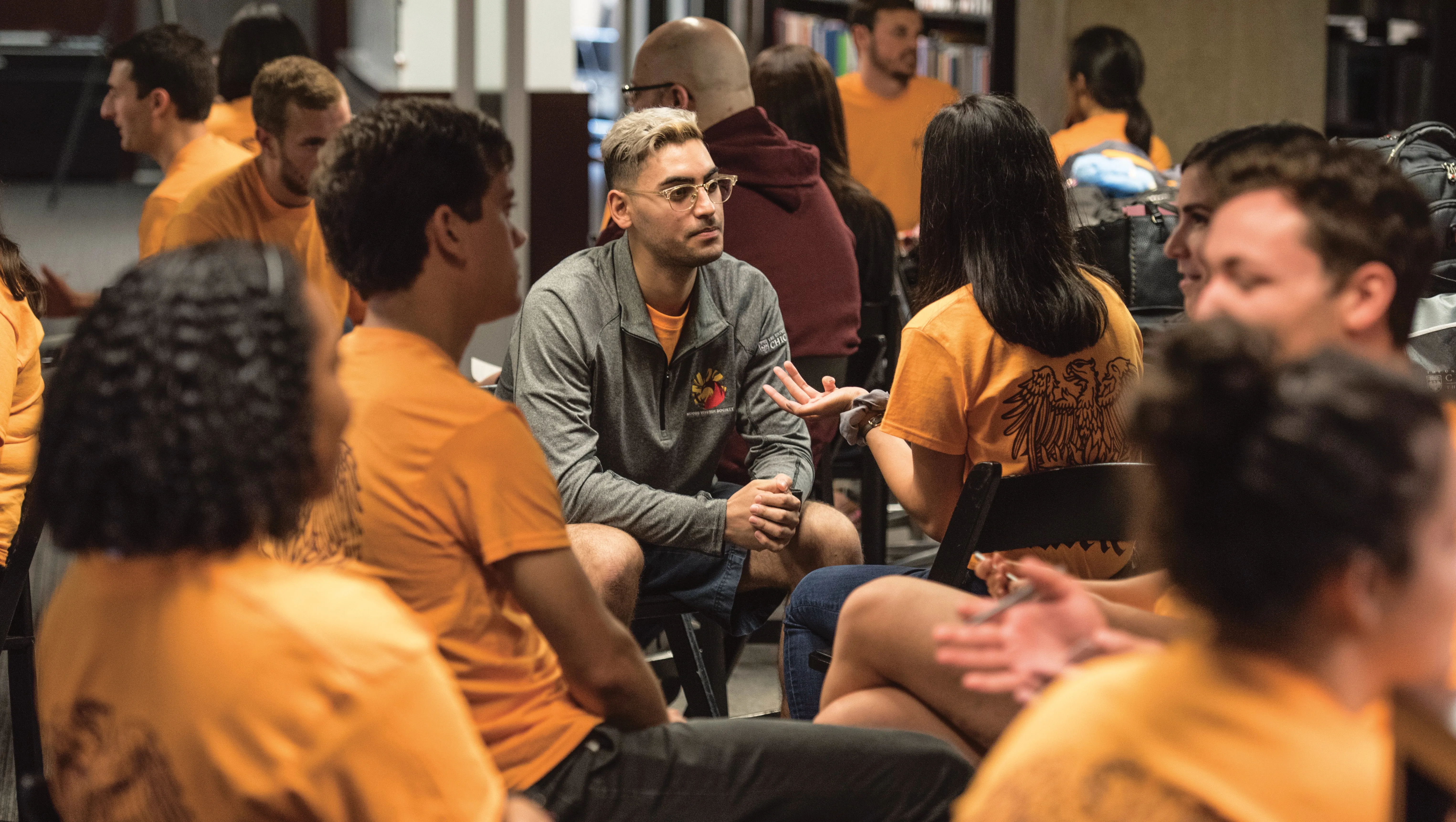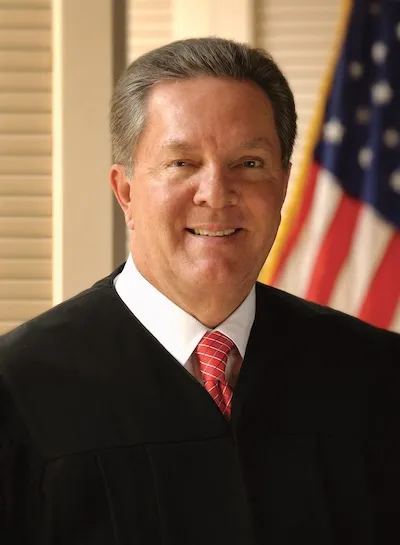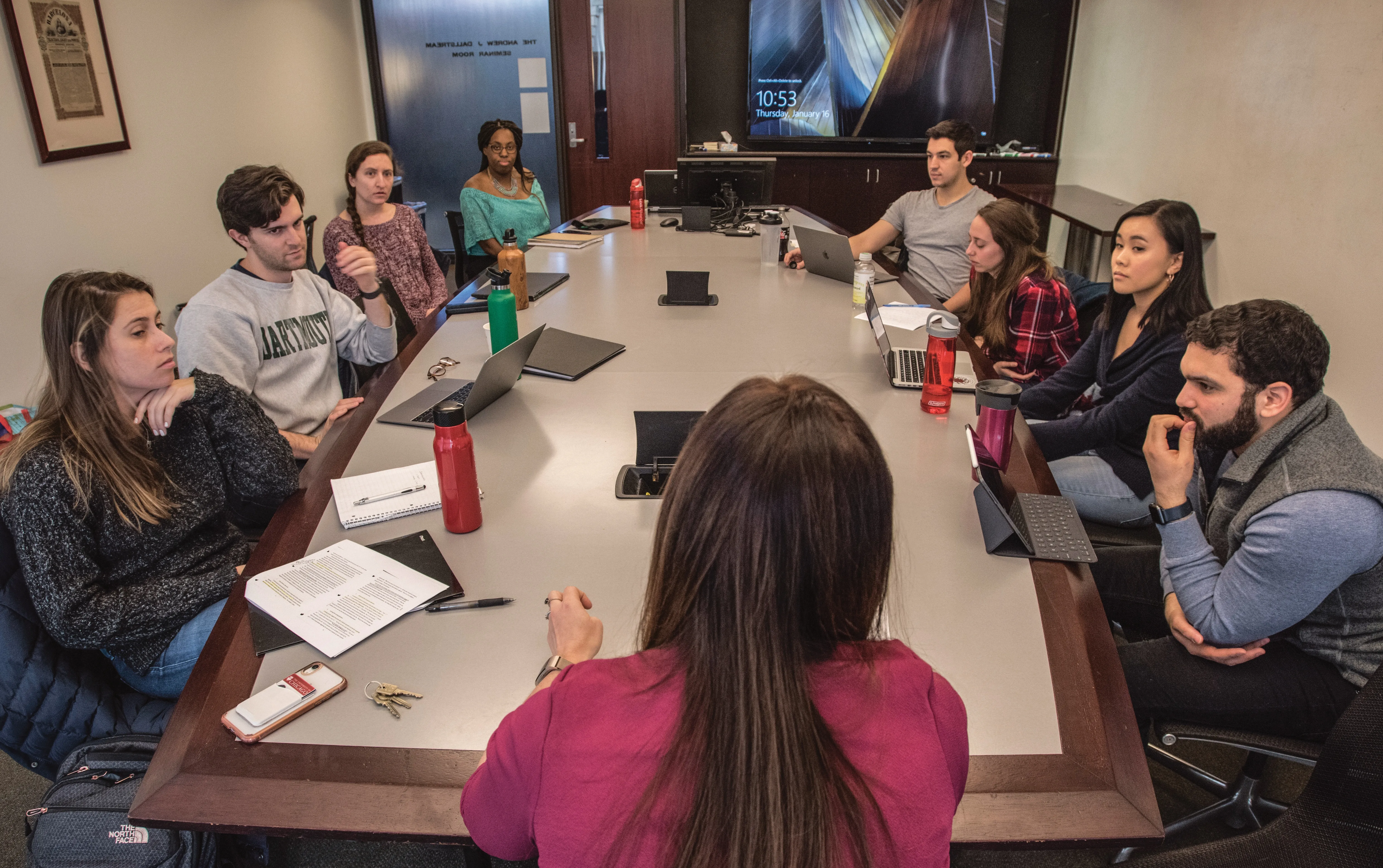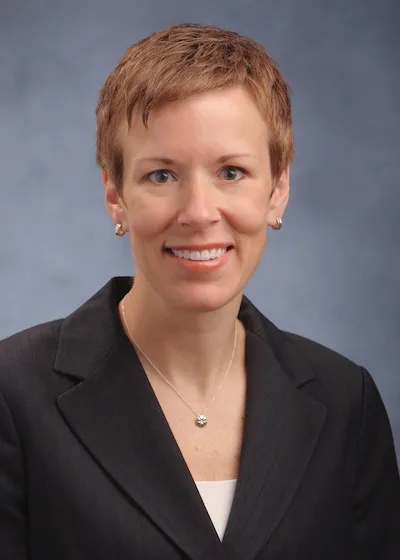Listening Across Differences

Sitting across from a classmate on the second day of Law School orientation, Kenny Chiaghana, ’22, noticed something new.
He and the other student—a stranger before that day—had been paired for the final exercise of Hearing One Another, a University of Chicago program that made its Law School debut this year.
What Chiaghana noticed was that his partner went out of his way to play down certain accomplishments, sometimes adding entire sentences and caveats. People often told Chiaghana that he did the same thing—but until that point, he hadn’t fully understood what they meant.
“Coming to the realization that I can learn something about myself by listening to others was very, very surprising,” Chiaghana said. “That you can be self-reflective even when you’re listening was a big takeaway for me.”
Moments like this are part of the idea behind Hearing One Another, an interactive workshop that combines behavioral science and improvisational exercises to help individuals communicate across differences and improve their listening skills. At the beginning of the workshop, knowing only its name, Chiaghana had been skeptical. But it wasn’t long before the walls came down and the negativity began to fall away. By the time the two-hour workshop ended, Chiaghana was surprised by how much he had learned about his classmates, and how much closer he felt to them as a result.
“I still remember almost everything [about the exchange with my partner],” Chiaghana said. “Because I really, really listened to this stranger, I got this deeper human bonding with a lot less time. It’s very inspiring.”
Rooted in Research and Improv
It was Dean of Students Charles Todd who decided to bring the innovative program south of the Midway when he joined the Law School in 2018. As deputy dean of students in the College, he worked closely on new student orientation, and he’d seen the positive impact Hearing One Another had had on undergraduates.
New law students, he figured, would benefit, too.
“I think that law students, just like anyone else, need to be reminded that listening is a skill,” Todd said. “As professional students who are getting their first professional network, it’s incredibly important that they form deep connections with their peers. And I think the skills that they reflect on and think about in this program can help them develop a network that will stay with them for many years to come.”
Hearing One Another is one of several proprietary workshops developed by the Second Science Project, which began in 2017 through a partnership between the Center for Decision Research at the University of Chicago Booth School of Business and The Second City, a Chicago-based improvisational theater company that includes classes, performances, and training programs.
“Hearing One Another grew from the notion that communication, inclusion, and a wide range of interpersonal skills can all be taught, practiced, and learned,” said Tiana Pyer-Pereira, an associate director in the University’s Office of the Provost who is responsible for developing programs related to the Diversity and Inclusion Initiative. “And when these skills are approached through the lens of theater and play, they become much more exciting and accessible. The tools of improvisation—actively listening to your partner, building on what they’ve said, cultivating an ability to be surprised by their perspective and then seamlessly switching gears—all of these skills apply to daily life just as well as to comedic performance. When you use these skills in tandem with decades of findings from behavioral science research, you get play with a purpose, play that is actually practice for life.”
The three-part Hearing One Another workshop is the same regardless of audience, with participants divided into sections led by seasoned facilitators from across the University. At the Law School, students move through the exercises with their “Bigelow” section—the group with which they take legal research and writing classes—and are joined by a member of the Law School faculty.
Professor William Hubbard, chair of the Law School’s diversity committee and a participant in this year’s workshop, appreciated that Hearing One Another’s exercises are based in evidence from psychology and behavioral science research. The workshop, he said, achieved two crucial orientation objectives.
“One is just to build a rapport among the students—to break the ice and get comfortable, and to make friends,” said Hubbard, who graduated from the Law School in 2000. “The other thing, which is trickier because there are so many ways to do it, and you can’t do them all in a week, is to build those skills in emotional intelligence that are so important to lawyering. It isn’t always the emphasis of what we do in the classroom, but it is so important to being a lawyer.”
A subset of the Second Science Project’s programs falls into the UChicago Inclusion Workshop series, including Hearing One Another. This series focuses on cultivating insights and interpersonal skills central to understanding one another across differences, and thus creating a more inclusive campus climate. Robin Graham, the associate director of student affairs and programs and the interim director of diversity and inclusion, said Hearing One Another highlights two key Law School values: freedom of expression and diversity and inclusion.
“It’s important that students are comfortable expressing their views and opinions, no matter the context,” Graham said. “But it’s equally important that they feel heard, and that they make that extra effort to listen and understand one another. Hearing One Another does an excellent job of helping them do just that.”
Another goal, Todd added, is to help students see their classmates as individuals and to emphasize the rich complexity of the Law School community.
“I want students to recognize that they are part of an incredibly diverse class of individuals who all bring something to the table,” he said. “Whether those individuals look like them, believe like them, think like them, live like them, or not. Getting to spend three years with that incredible diversity is a great privilege. I hope that they all recognize how special that is, and that they take getting to know this new community very seriously.”
Seeing beneath the Surface
After Hearing One Another’s first exercise—an icebreaker and introduction to improv—students formed a circle and took turns offering statements about themselves, sharing details about their likes and dislikes, backgrounds, beliefs, and more. The information didn’t need to be deeply revelatory or profound to be effective, though students were encouraged to share increasingly personal statements over the course of the exercise. The goal was to help participants “individuate,” or to see each other as complex individuals rather than predictable stereotypes.
The exercise was based on 2003 research led by social psychologist William Swann Jr., who divided a cohort of incoming MBA students into small study groups and asked them to fill out three surveys. The first, administered before the groups met, asked participants to describe their own views and abilities. The second, administered shortly after the groups met, asked participants to describe their impressions of one another. The third also asked participants to describe each other—this time at the end of the semester. Researchers found that the more people “individuated” when they first met, the more included they felt in the group—and the better they did at getting to know each other over the long term and working together as a team.
This made sense to Caitlan Sussman, ’22, who said the exercise underscored the danger in making assumptions about classmates when meeting them for the first time.
“You should never assume anything about anyone. You don’t know what’s going on in their lives. You don’t know how they’ve been raised and you don’t know what their beliefs are,” Sussman said. “We’re such a diverse class and we’ve all been through so many different things, but there’s a lot we actually have in common as well.”
During the exercise, Hubbard realized that expressing his own beliefs could help others open up about theirs.
“Part of effective communication is sharing things about yourself,” said Hubbard, who had the students he met in the workshop in his fall quarter Civil Procedure class. “It’s good to try to be a little more open when you’re getting to know people, and to get to know them on more than a superficial level. That was a really useful takeaway.”
The exercise led Chiaghana to see his classmates more fully as they shared pieces of themselves. For instance, a quiet demeanor didn’t mean a person was unapproachable or unfriendly, he said.
“[People would] share things about themselves, and I would think, ‘Oh, that’s why this person’s like this, they’re not trying to be rude,’” Chiaghana said. “‘ They’re not trying to exclude me for any reason. This is just who this person is.’”
Different Ways of Listening
For the last exercise, students divided into pairs and took turns speaking from prompts while their partners practiced different listening styles.
This exercise was rooted in a 1982 study by Robert E. Kraut and his colleagues that examined different listening approaches by asking participants to watch a movie they had never seen before. Days later, the subjects returned to summarize the movie for two different listeners—one who had been assigned to listen silently and one who had listened actively, interrupting with as many comments and questions as they liked.
Those who offered feedback, the researchers found, tended to retain more information and better understand the speaker’s experience.
That was true in the Hearing One Another exercise—but only in certain situations. Some students noted that providing consistent feedback during a conversation could distract both the speaker and the listener.
Faculty participant Sarah Konsky, a clinical professor, said the exercise made her think more about how different listening styles might fit different situations.
“I think many of us in our session walked away with the idea that, for different kinds of conversations, it’s good to have different listening approaches,” said Konsky, who is the director of the Jenner & Block Supreme Court and Appellate Clinic. “Sometimes you do want to be very passive and just let the other person share what they need to share. Other times it’s better to be engaged in the conversation, affirming what they’re saying or disagreeing.”
For one of the prompts, speakers had to discuss something they found stressful while listeners took in the information passively. This part of the exercise, Chiaghana said, helped him consider how he comes across when expressing frustration or negativity.
“I started to realize that when you’re talking about something that you find stressful or uncomfortable, you can very easily start taking it out on the person,” he said. “Whereas if the person had been nodding at me, I might not have noticed that I was passing off so much negative energy. It definitely made me realize that you need to actively consider how other people are hearing you, not just how you’re hearing yourself.”
The exercise encouraged Sussman to pay more attention to how, and how often, she would listen to her classmates.
“In a place like law school, we might be so busy listening to a professor that when classes end, we switch off a little bit,” Sussman said. “I think it’s really important in a class full of all these amazing talented people to make time for
a small conversation with them and listen to what they have to say. Simply listening to someone can make them feel so supported.”
For Todd, it was important that students learned these skills in an active workshop rather than in a lecture setting. The hands-on exercises, he said, also helped incoming first-year students lower their boundaries and get to know one another from the beginning of orientation.
“Like any skill, [listening] is something that you can practice and that you can get better at,” Todd said. “It is something that you engage in different ways, in different contexts. I think that’s a very useful reminder for all of us, not just for students.”
Months after participating in Hearing One Another, Chiaghana reflected on the experience—the workshop, he said, was crucial in setting the tone for orientation as well as the first year at the Law School.
“If we hadn’t done those exercises, we might have known a lot less about each other. We could have had our walls up a lot longer,” Chiaghana said in January, four months after participating in the program. “But the more you see people as individuals, the more you start to realize that you shouldn’t stereotype people based on how they look, or on certain demeanors. The more you start to see people as individuals, the more you start to see that we’re actually not very different at all.”
* * *
This story was originally published in November 2019 and expanded in April 2020.







